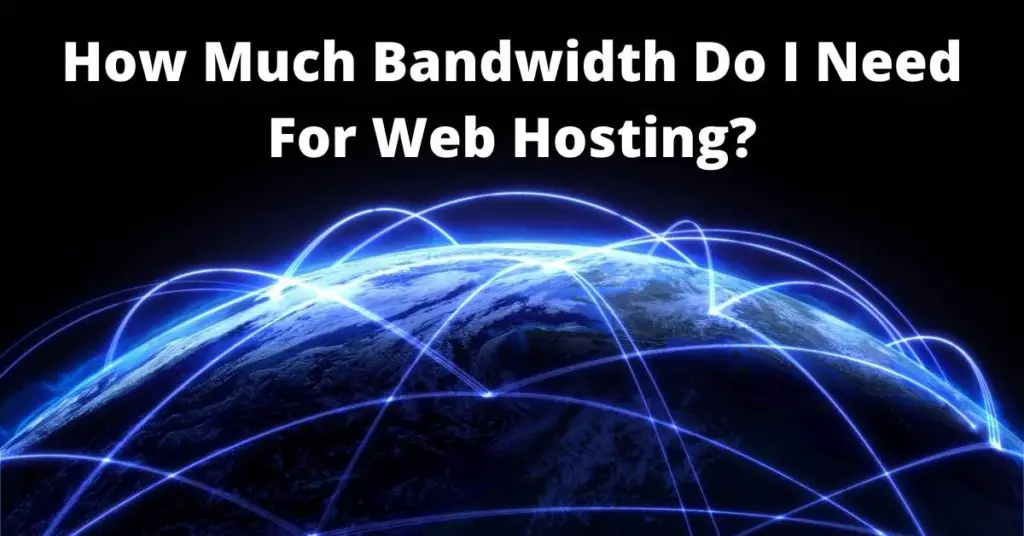So, you’ve gone ahead and purchased a domain name, and you’re now thinking about web hosting. And maybe asking yourself how much bandwidth do I need for web hosting? There are many web hosting service providers to choose from, all offering different types of web hosting services.
Bandwidth is the amount of data transmitted to and from your website.
You just need to choose the one that allows for enough bandwidth for uploading and downloading the amount of data for your website. For example, one of my smaller sites which receives around 5000 page views per month, uses 2GB of bandwidth. I recommend you start with a hosting package with at least 5GB of bandwidth.
| Provider | Bandwidth | Disk Space |
|---|---|---|
| Bluehost | Unmetered | 50 GB SSD |
| Inmotion Hosting | Unlimited | 50GB SSD |
| Hostgator | Unmetered | Unmetered |
Web hosting companies might list their bandwidth in MB or GB. 1024MB equals 1GB
Bandwidth and disc space are two of the most basic requirements for web hosting.
Many providers promise unlimited bandwidth, but if you look carefully, you realize that, in some cases, it’s not truly unlimited. They have defined what usage is ‘normal’ and penalties if your usage surpasses that limit.

Having said that, knowing how much bandwidth is required for your website needs a bit of knowledge.
What Is Bandwidth?
In web hosting, bandwidth is the amount of data you can upload and download from your website per month provided by your web hosting services provider.
Bandwidth usage depends on the size of the pages on your website, the number of visitors, and the number of page views. It’s just a product of these three.
Bandwidth = Web Page Size X No. of Visitors Per Month X No. of Page Views
For example, if you’re page size on average is 60KB with 10,000 visitors per month, each visiting five pages, then the required bandwidth is:
0.060MB X 10,000 X 5 = 3,000MB
For the data usage in GB, take 3000MB / 1024 = 2.9GB
The other way of calculating the bandwidth required is to use the total page views per month. Using the example above, we take the 10,000 visitors and times the number of page views per month of each visitor.
10,000 x 5 = 50,000 page views per month
| Average Page Size | Number of Visitors | Page Views per Visitor | Total Page Views Per month | Bandwidth Required |
|---|---|---|---|---|
| 0.060MB | 10000 | 5 | 50000 | 3000MB |
| 0.060MB | 10000 | 1 | 10000 | 600MB |
| 0.100MB | 10000 | 5 | 50000 | 5000MB |
| 2MB | 10000 | 5 | 50000 | 100000MB |
However, that is bandwidth calculation without factoring in user downloads. So if your page allows for user downloads, you have to add the total amount of downloads per month.
Bandwidth = [Web Page Size X No. of Visitors Per Month X No. of Pageviews] + [Average Downloads per Month X Average Download Size]
Also, you need to remember this will include any data you’re uploading while creating your site.
Additional Factors To Include In Your Bandwidth Calculation
Just knowing that bandwidth is a product of average page size, visitors and pageviews are not enough. You also have to allow extra room for traffic growth and spikes.
One example of a traffic spike could be sharing a post on social media, and the post goes viral, and after a couple of days, it stops being shared.
A knowledgeable website owner knows that there are times when a website gets more traffic than other times. Therefore, I recommend starting with a 50 % margin to avoid slow connections and downloads in case of traffic spikes.
Using the above formula, I have calculated that I will need 3000MB for my bandwidth. I should be thinking about budgeting for 4500MB to cover any spikes
So, a detailed breakdown of factors to keep in mind when calculating bandwidth are:
- Average page size – Page size matters, heavy pages slow down websites. Optimize your images and videos to reduce the page size. Aim for a 50-60KB page size, at maximum.
- Average monthly visitors
- Average pageview per visitor
- Average downloads per month
- Average file size
- The redundant factor for traffic growth and spike
Bandwidth = ([Web Page Size X No. of Visitors Per Month X No. of Pageview] + [Average Downloads per Month X Average Download Size]) X Redundant Factor
Why Does Bandwidth Matter?
It’s simple when your bandwidth does not match your traffic activity, two things happen:
- The extra bandwidth goes to waste if your actual traffic is significantly smaller than your estimates. You will be paying money for resources you don’t need. What a waste!
- Your hosting provider could limit the bandwidth, which will impact your site speed. This will affect your visitor’s experience. Worse case is your hosting provider might block your site, and your visitors will see a message resource limits reached.
Disadvantages of a slow website include:
A slow website makes it hard to share content. So not only will you lose traffic, but when users are frustrated, they go to your competitors for goods and services. Which could end up losing you money on sales, ad revenue, or affiliate income.
For businesses, a website is essential for growth. It has a broader reach, allowing the company to target a wider market and establish an online presence. Many customers trust brands with great websites and avoid brands with poorly performing websites.
Good bandwidth allows more clients to check your site simultaneously and still enjoy an incredible experience.
Types of bandwidth offers?
If you’ve looked into hosting plans, you know providers offer three types of bandwidth: metered, unmetered, and unlimited bandwidth.
Metered bandwidth
A metered plan is where the provider tracks and monitors your data usage then charges according to the usage. That means that if you get more visitors, you pay more.
Unmetered bandwidth
Unmetered bandwidth is the opposite of metered bandwidth. Here you are given a fixed amount of bandwidth to use as you’d like. For example, if you’re given a 1Gbps bandwidth, it means you can transfer as much data as you want but at the specified server speed. You won’t be charged more for traffic spikes; unmetered bandwidth charges are usually at a flat rate.
Unlimited bandwidth
Unlimited connection is the other type of bandwidth offer on the market. Most people like their choices of unlimited. However, when it comes to web hosting, most offers of unlimited bandwidth aren’t actually unlimited and may have restrictions. Indeed, it’s impossible to have unlimited data transfer speeds and usage.
While some companies do their best to guarantee incredible data transfer speeds, many companies just use the world ‘unlimited’ as a marketing ploy.
Which bandwidth to choose?
Given a choice between metered, unmetered, and unlimited bandwidth, it’s usually best to choose the unmetered hosting plan. Unmetered bandwidth charges are fixed. You get bandwidth and use it as you want.
On the other hand, metered bandwidth hosting plan costs increase with your website traffic. The last thing you want is the hosting company tracking your traffic activity and charging you extra for additional traffic.
An unlimited hosting plan could be great if it were true. Unfortunately, however, most promises of unlimited bandwidth don’t work as advertised. Indeed, most of them say their bandwidth is unlimited but keep an eye on your traffic and kick you off as soon as it surpasses a certain magic number.
With unlimited bandwidth, make sure you always read the terms and conditions.
Conclusion
Should you worry about web hosting bandwidth? Bandwidth is a crucial part of web hosting; figuring out how much of it you need will keep you from paying more for a resource you don’t need or losing clients because your choice of bandwidth isn’t big enough for the amount of traffic your site is getting.
Use the above tips to choose the suitable bandwidth for your website, and make sure to read between the lines and the small print. If a deal seems too good to be true, think twice!

Leave a Reply